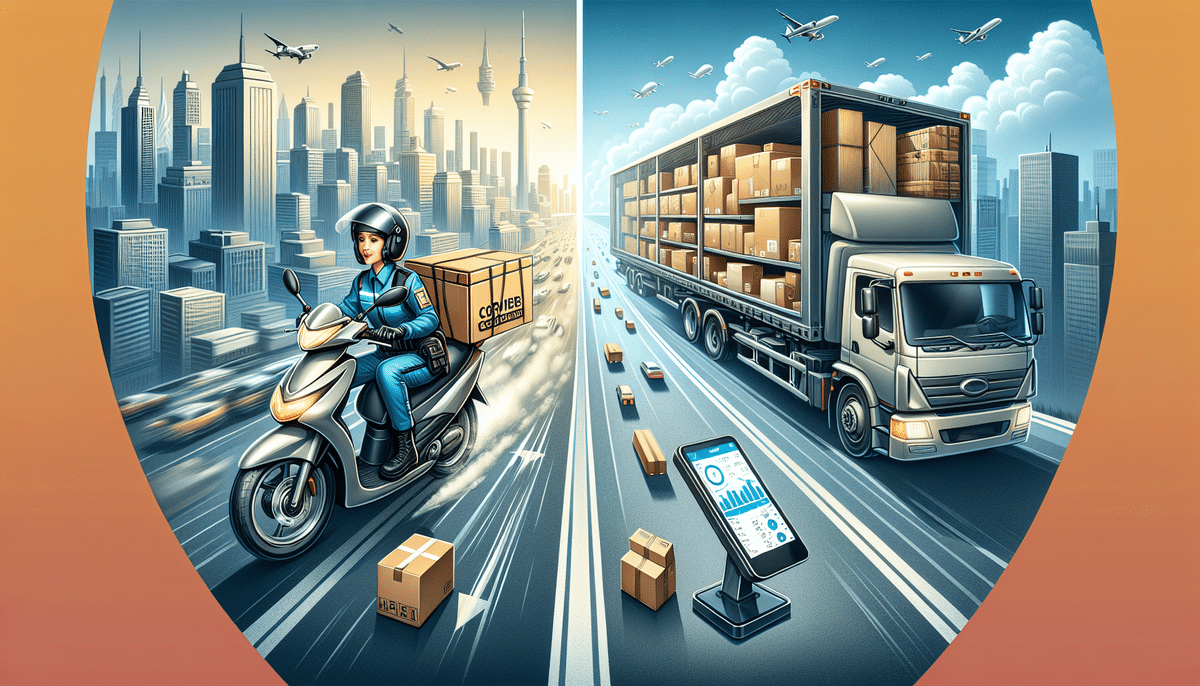Comparing Courier and Carrier Services: Understanding the Differences
Efficient transportation of goods is crucial for businesses, whether it's delivering products to customers or moving supplies between branches. Among the most common options for businesses are courier and carrier services. Although these terms are often used interchangeably, they encompass distinct services with unique benefits. This article delves into the fundamentals of courier and carrier services, highlights their key differences, and provides guidance to help you choose the best option for your business needs.
Understanding Courier Services
What is a Courier Service?
Courier services specialize in the rapid delivery of small parcels and documents. They are designed to ensure quick, secure, and reliable delivery, often completing shipments within hours or a single day. Courier companies manage the entire process from package pickup to final delivery, utilizing their own fleet of vehicles and trained personnel or partnering with other firms to extend their reach.
Advantages of Using Courier Services
- Speed: Couriers offer expedited delivery options, including same-day and next-hour services.
- Real-Time Tracking: Most courier services provide online tracking systems, allowing businesses to monitor their shipments in real-time.
- Security: Enhanced security measures and insurance options ensure that packages are protected against loss or damage.
- Specialized Handling: Services tailored for fragile, perishable, or high-value items.
According to recent industry reports, the global courier services market is expected to grow by 7% annually, driven by increasing e-commerce activities and the demand for faster delivery options (Source).
Understanding Carrier Services
What is a Carrier Service?
Carrier services focus on transporting larger, bulkier items such as pallets, crates, and heavy equipment over long distances. Utilizing large trucks and specialized vehicles, carriers handle substantial and cumbersome shipments that require significant space and resources. These services often extend beyond mere transportation to include warehousing, packaging, and comprehensive tracking solutions.
Advantages of Using Carrier Services
- Cost-Effective: Carriers offer more affordable rates for shipping large volumes due to economies of scale.
- Flexibility: Suitable for a wide range of goods, including oversized and irregularly shaped items.
- Comprehensive Services: Additional offerings such as warehousing, freight consolidation, and supply chain management.
- Extensive Networks: Ability to cover national and international routes, accommodating long-distance shipments.
Key Differences Between Courier and Carrier Services
Size and Type of Goods
Courier services are ideal for small to medium-sized packages that require quick delivery. In contrast, carrier services are suited for large, bulky items that necessitate more space and specialized handling.
Cost
Courier services tend to be more expensive due to their focus on speed and personalized handling. Carrier services are generally more cost-effective for bulk shipments since they can transport larger volumes at once.
Delivery Speed
Couriers offer faster delivery times, often providing same-day or next-day service. Carriers, while not as fast, provide scheduled deliveries that may take several days, depending on the distance and logistics involved.
Security and Tracking
Both services offer tracking, but couriers typically provide more detailed, real-time tracking due to the nature of their operations. Carrier services offer reliable tracking as well, though it may be less granular compared to courier services.
Delivery Areas
Courier services usually operate on a local or regional scale, ideal for urban deliveries. Carrier services have a broader reach, capable of handling national and international shipments.
Types of Courier and Carrier Services
Types of Courier Services
- Standard Courier: Offers delivery within a few hours to a day.
- Same-Day Courier: Ensures delivery within the same day of booking.
- International Courier: Facilitates global shipments with tracking and insurance.
- Specialized Courier: Handles specific items like medical supplies, legal documents, or fragile goods.
Types of Carrier Services
- LTL (Less Than Truckload) Carriers: Transport goods that do not require an entire truck.
- FTL (Full Truckload) Carriers: Handle shipments that occupy the full capacity of a truck.
- Intermodal Carriers: Utilize multiple transportation modes (road, rail, sea) for long-distance shipments.
- Specialized Carriers: Include refrigerated carriers for perishable goods and flatbed carriers for oversized items.
Choosing the Right Service for Your Business
Choosing a Courier Service Provider
- Delivery Speed: Ensure the provider can meet your required delivery timelines.
- Security: Check for robust tracking systems and insurance options.
- Reputation: Research the provider’s track record and customer reviews.
- Customer Support: Opt for providers offering 24/7 support to handle queries and issues promptly.
Choosing a Carrier Service Provider
- Experience and Reputation: Select carriers with proven reliability in handling large shipments.
- Type of Goods: Ensure the carrier can accommodate the specific requirements of your goods.
- Cost: Compare pricing structures to find a service that fits your budget.
- Insurance and Liability Coverage: Verify the extent of coverage provided for your shipments.
Cost and Delivery Speed Comparison
Cost Comparison
Courier services generally command higher prices due to their expedited delivery and personalized handling. In contrast, carrier services offer more economical rates for bulk shipments, making them ideal for businesses looking to minimize transportation costs.
Delivery Speed Comparison
When speed is a priority, courier services are the superior choice, providing rapid delivery options. Carrier services, while not as swift, offer reliable scheduled deliveries suitable for non-urgent shipments.
Tracking, Support, and Insurance
Tracking and Monitoring Capabilities
Couriers typically provide advanced tracking systems with real-time updates, ensuring transparency throughout the delivery process. Carrier services also offer tracking, though it may be less detailed, focusing more on overall shipment progress.
Customer Support
Courier services often boast personalized customer support with dedicated representatives available around the clock. Carrier services provide reliable support, though it may be less personalized, addressing general inquiries and issues as they arise.
Insurance and Liability Coverage
Both courier and carrier services offer insurance options to protect against loss or damage. Courier services usually provide higher coverage levels for individual packages, while carrier services offer comprehensive coverage for bulk shipments, tailored to the specific nature of the goods transported.
Pros and Cons of Courier and Carrier Services
Pros and Cons of Using a Courier Service for Your Business
- Pros:
- Fast and reliable delivery for smaller goods
- Personalized services with enhanced security options
- Real-time tracking and frequent updates
- Cons:
- Higher costs compared to carrier services
- Limited capacity for larger, bulkier items
Pros and Cons of Using a Carrier Service for Your Business
- Pros:
- More affordable for transporting large volumes
- Capable of handling bulky and heavy items
- Extensive delivery networks covering national and international routes
- Cons:
- Longer delivery times compared to courier services
- Less personalized service and tracking details
Conclusion: Making the Right Choice for Your Business
Choosing between courier and carrier services hinges on various factors, including the size and type of goods, required delivery speed, budget, security needs, and the scope of delivery areas. Courier services are ideal for businesses that prioritize speed and require reliable delivery of smaller packages. Conversely, carrier services are more suitable for transporting large volumes or bulky items cost-effectively over longer distances.
Evaluate your business’s specific needs, assess the reputation and capabilities of service providers, and consider additional factors such as tracking, customer support, and insurance coverage. By carefully weighing these elements, you can select the transportation service that best aligns with your operational requirements and business objectives.
For more information on optimizing your shipping and logistics, visit ShipScience.




















